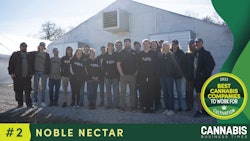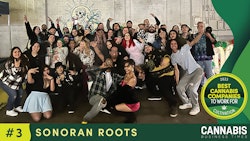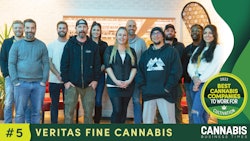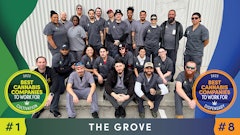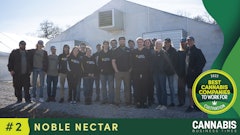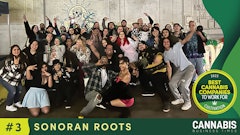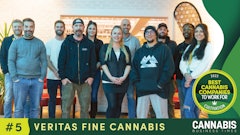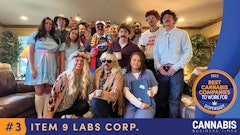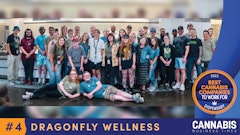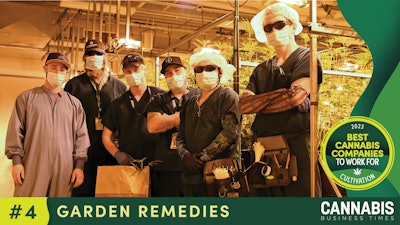
Editor's note: Presented by Cannabis Business Times in an as-told-to format. Vigeant and Herold shared below information directly with CBT. Edited for length and clarity
Kyle Vigeant: Everyone was telling me, you can’t make a living doing this, it’s not a thing, and I kind of pushed that to the side. [Working in the cannabis industry] is always something I wanted to do. After high school I jumped right into agriculture to try to get as much of a grip around large-scale growing as I could, before it was even legal [in Massachusetts].
I got a job at the time at the world’s second largest cranberry producer, so I got to learn a lot about agricultural practices, applying different fertilizers and growth techniques, to prepare for cannabis. It was about three and a half to four years that I was down at the cranberry bogs. From there I moved up to Maine where it was legal before Massachusetts went full. I worked with some caretakers up there and did a lot of cannabis growing. I put my hands in the dirt.
Now that it’s legal and it’s acceptable what I do for a living it’s a little easier to talk about, but I was always into cannabis from a young age. It was something that helped me focus on what I wanted to do, rather than just these racey thoughts in my head, everyone saying you got to go to college, you go to do this, you got to that. Sometimes it’s better to sit back and see what calls you, and try to pursue that.
I initially got a job with Garden Remedies in 2016 as one of the three assistant growers. I went from assistant grower to cultivation manager to IPM [integrated pest management] manager to director of cultivation to director of operations to vice president of cultivation, where I am now.
Jeffrey Herold: We’ve built a company that really focuses on moving people up and constantly finding ways to grow their careers internally.
Post high school, I did four years in the Navy. After I got out of the Navy, I worked for [LSG] Sky Chefs, which is an airline catering company. I worked my way up to director of ops there. My boss at the time left, so I followed him to Brady [Solutions], which was a copacking, food manufacturing company. With cannabis, you immediately fall in love with the culture and the passion of the people behind the scenes. [Garden Remedies] was an opportunity in a growing industry. I [started] in supply chain, then co-COO and now CEO for about a year.
KV: Cannabis culture is number one here. We want to stay with our roots. We like to be open about cannabis, we like to have fun, we like to be creative. But one of the biggest things that is not just about cannabis, is flexibility. In the cannabis industry, everything changes so rapidly.
Cannabis culture used to mean something very different than it does now. I think 10, 15, 20 years ago, cannabis culture was outlaw culture. Now the culture is for the people. People started growing and pushing this market because they wanted safe access to cannabis. They wanted cannabis that was high quality. They wanted to feel normal about it.
We try to hire people that are willing to put in that work and just get their hands dirty, and when you see that, you continue to give those people opportunities to step up and really empower them to go out of their comfort zone and try new things and push themselves, and I think that’s what they’ve done with me and Jeff and a lot of other people. I didn’t come into this business with a [college] degree, they just saw the potential in someone who is willing to work hard.
That’s what I see in our cultivation crew, We look for people that want to work hard and be part of something they can be proud of. It’s really cool to say you grow weed. It’s even cooler to say you’re proud of the weed you grow. Garden Remedies has given us massive opportunities and trusted us.
Since the industry is so new, a lot of customers don’t necessarily know what they’re looking for. There are a lot of misconceptions about flower, that high THC is a good quality indicator.
We’re trying to bring in what really is quality and align it with what the customers think they want. We have a whole line of Garden Remedies-created strains, so breeding has been a big focus for the past two years, because we believe everyone is going to have high THC in the next couple years, but what’s going to set you apart is the superior genetics, different terpene profiles, stuff like that, so we put a lot of emphasis on breeding here at garden remedies.
IP is a touchy subject in this community because everybody thinks their IP is special, but it really comes down to how good your crew is.
About Garden Remedies
JH: There’s a lot of companies that do exactly the same thing. I say to my team all the time that I don’t really think we know who we are yet. We’re still kind of infants, wandering around and trying to stand up. For us it’s all about finding ways to tell our own stories and be different than everyone else. But at the end of the day, you’re trying to convince people to buy a product. It’s a really hard time right now. The challenge in the industry is just superior price compression. Our three stores are busier than they have ever been traffic wise, but the average price per ticket is down significantly because the price people are willing to pay for cannabis is so much lower than it was a year ago.
We had a board member that said to me a few months ago, that the thing about competition is that somebody is going to win. It’s not like when there’s competition, everybody fails and everybody loses. You just have to find a way to outcompete.
There are six topics we constantly reinforce. And one of the big ones that I talk about all the time is radical honesty. At our company, we’re not afraid to say when things are good or when things are bad. So our team members know the reality of the situation.
Everyone in the company is a keeper of the culture. We don’t want people that don’t fit in our culture around, because it will turn things negative, and it’s not good for either party if you don’t believe what we’re doing or won’t work cohesively with the team that’s in place.
We’ve specifically tried to take a step back and say we’re going to focus on Massachusetts and not get too distracted by all of the next new shiny markets that are opening. But my hope would be at some point that we start getting back into growth mode versus survival mode.
Sometimes we feel we need to go do all these crazy things. And at the end of the day, it’s like, no, you just need to make the people who are coming in the store every day happy. It’s not that complicated. Just keep doing the basics, and good things will happen.








